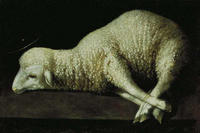The Silence of the Lamb
Q: After Jesus was arrested they asked Him if He was the Son of God. He said, “You say that I am.” I’ve never understood this. It was a straight question so why didn’t He just say “Yes”? Was He ashamed or scared to admit it?
A: Jesus displayed reticence during His entire questioning. None of the four Gospels quote Him giving extended answers to High Priests, Sanhedrin (the Jewish ruling council), or Herod. Your example from Luke 22:70 is one of several opportunities where He had opportunity to reply and either said nothing or responded with a minimum of words. Yet while using these few words, Jesus also connects Himself with the God of Israel, the great “I Am Who I Am” of the burning bush (see Exodus 3:14).
 Scripture is largely silent concerning the why of Jesus’ silence. However, a few clues help us gain insight. In the last of Isaiah’s four Servant Songs, we read, “He was oppressed, and he was afflicted, yet he opened not his mouth; like a lamb that is led to the slaughter, and like a sheep that before its shearers is silent, so he opened not his mouth. (Isaiah 53:7)”
Scripture is largely silent concerning the why of Jesus’ silence. However, a few clues help us gain insight. In the last of Isaiah’s four Servant Songs, we read, “He was oppressed, and he was afflicted, yet he opened not his mouth; like a lamb that is led to the slaughter, and like a sheep that before its shearers is silent, so he opened not his mouth. (Isaiah 53:7)”Surely for many who expected a glorious Messiah, appearing with divine justice and might of arms to free Israel, such passages confused and perplexed them. No loud commands, no bold statements, no marching armies or golden crowns and thrones — instead, the Lord’s chosen Servant would suffer and die. He would silently bear the punishment for our sins, and the sins of the whole world.
This very passage captured the attention of the Ethiopian eunuch in Acts 8:26-40. Led by the Holy Spirit, Philip the deacon approached the eunuch’s chariot in time for the latter to quote Isaiah. He then asked Philip, “About whom, I ask you, does the prophet say this, about himself or about someone else? (Acts 8:34)” Philip seized the opportunity and “beginning with this Scripture he told him the good news about Jesus. (8:35)”
While Jesus’ silence fulfilled Messianic prophecy, it also served other purposes. By not speaking of Himself, He forced His enemies to testify of Him. While it may have left a bitter taste in their mouths to even utter the words, He forced them to mention Him in the same breath as “Son of God,” “Son of man,” and “Christ,” and then told them that they’d just confessed Him as “I Am.”
In my mind, this foreshadows what will happen when He returns in judgment. While only the believers now willingly confess His name, at His Second Coming, all will be forced to accept who He is. The believers will continue their willing confession even as they are translated to eternal bliss; the unbelievers will be forced to submit physically and verbally to Him: “At the name of Jesus every knee should bow, in heaven and on earth and under the earth, and every tongue confess that Jesus Christ is Lord, to the glory of God the Father. (Philippians 2:10-11)”
Returning to the Passion, we note that when He thought it necessary, Jesus answered more fully. He saved much of His “silent treatment” for those who should have known better, recognized Him from Scripture, and followed Him willingly: “Now Jesus stood before the governor, and the governor asked him, ‘Are you the King of the Jews?’ Jesus said, ‘You have said so.’ But when he was accused by the chief priests and elders, he gave no answer. (Mt 27:11-12)”
When before the Roman governor, Jesus first led Pilate on a verbal chase concerning His kingship (see John 18:33-35). However, He also plainly told Pilate, “My kingdom is not of this world (18:36)” and went on to proclaim Himself as “witness to the truth. (18:37)” This led Pilate to ask one of Scripture’s most famous questions, “What is truth? (18:38)” Sadly, Pilate was looking Truth in the eye and didn’t recognize Him.
The painting Agnus Dei was done by Francisco Zurbarán c. 1636-40.
Scripture quoted from The Holy Bible, English Standard Version™, © 2001 by Crossway Bibles.
Send email to Ask the Pastor.
Walter Snyder is the pastor of Holy Cross Lutheran Church, Emma, Missouri and coauthor of the book What Do Lutherans Believe.

1 Comments:
Paul L. Maier, in his book “In the Fullness of Time” (1997), has a different take. Maier says that Jesus’ apparent circumlocution was actually a common Jewish way of answering questions of grave import.
In the episode of Jesus before the Jewish High Priest, Caiaphas says, “I put you under oath before the living God, tell us if you are the Messiah, the Son of God!”
Jesus said,
“I am” (Mark 14:62)
“You have said so” (Matthew 26:64)
“You say that I am” (Luke 22:70)
Maier says that all three answers are really identical:
Even though the wording in Matthew and Luke may sound evasive, Jewish custom discouraged a bald yes or no to questions of grave import. Just six hours earlier at the Last Supper, Jesus had also replied to Judas' question, "Is it I?" with a sad, "You have said so" (Matthew 26:25).
Apparently Caiaphas heard Jesus say he was the Messiah for he cried "Blasphemy! Do we need any further witnesses?"
Post a Comment
<< Home